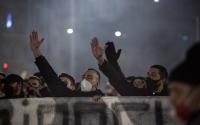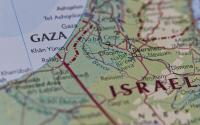The Guardian, 6 December, 2001
The support from the Bush administration for Ariel Sharon's latest onslaught on the West Bank and Gaza must surely bring to an end any illusion that, in the wake of September 11, United States influence would be brought to bear to achieve a just peace in the Middle East.
In the first phase of the Afghan war, when US bombing was making little headway and the mood in the Arab world febrile, there was much speculation that American screws would at last be turned on their Israeli ally to draw the poison of Muslim rage. Israel's hardline leaders would be forced to bow the knee for a viable Palestinian state, it was said, in the cause of the wider war against terror.
Barely a month later, with the Taliban confined to their Kandahar fastness and the US preparing to turn its firepower elsewhere, all that has been discarded. Instead of pressure on Israel to end its 34-year-old illegal military occupation, the US is cheering on its attempt to smash the fragile institutions of the Palestinian Authority. Instead of using its unparalleled leverage to help bring about new negotiations, the US has lined up behind Sharon, the man of blood responsible for the deaths of hundreds of Palestinian civilians in the past year, and still facing war crimes investigations over his role in the Sabra and Shatila massacre of 1982.
Both Britain and the EU have echoed Bush, demanding that Arafat cracks down harder on the Islamists, while Tony Blair - whose efforts to encourage renewed Middle East peace talks last month were swatted contemptuously away by the Americans - expresses sympathy for Israel as its forces pound Gaza, Nablus and Ramallah from US-supplied F-16s and Apache helicopters.
Most ominously, Bush has signalled his understanding of the Israeli cabinet's decision to brand the Palestinian Authority a "terror-supporting entity" and frozen the US assets of charities supporting the Palestinian Islamist group Hamas. The earlier US distinction between Palestinian resistance and al-Qaida-style global terror appears to have been abandoned, as the secular core of the Palestinian national movement is absurdly lumped together with the Taliban. Thus is the war on terror being widened and deepened - with the drum-beat for war on Iraq growing ever louder - in ways that seem certain to rebound on its instigators with deadly ferocity in due course.
The latest air strikes were carried out in retaliation for the weekend's Hamas suicide bomb atrocities - which were in turn a response to Israel's assassination of the Hamas leader Mahmoud Abu Hanoud. But reports of such horrors as some sort of macabre game of tit-for-tat fail to convey the huge inequality of resources and military muscle at the disposal of the two sides.
One is a regional superpower with western living standards, the beneficiary of more than $3bn US aid a year; the other barely an embryonic state, operating in a collection of tiny bantustans, equipped with only light arms, its population enduring falling third world living standards, unable to move freely in its own land.
One side, Israel, has violated UN resolutions for decades with impunity by maintaining its occupation of Palestinian territory (most of the West Bank remains under full Israeli control), imposing collective punishments and building illegal settlements. The other side has every right under international law to resist that occupation by force, but it has paid a heavy price for doing so. Since the second intifada began 14 months ago, some 870 Palestinians have been killed and perhaps 25,000 injured; Israeli deaths have been about 245, with maybe 800 injured.
The right to resist does not of course mean the right to target civilians, as Islamist suicide bombers have done in acts of carnage and despair. But the same applies to Israeli soldiers who shoot stone-throwing children - and yet there have been no western demands for Israel to crack down on its trigger-happy snipers or lock up its assassination squads. If Arafat were to concede to pressure and move decisively against the Islamists, whose support is growing among the Palestinians precisely because his strategy of negotiation has failed to deliver, he would be seen as little more than a collaborator with occupation. If Arafat cannot guarantee the security of his own people, supporters ask, why should he guarantee the security of Israel?
Sharon's decision this week to target the Palestinian Authority, rather than Hamas, demonstrates what little interest his government has in reaching a peace settlement. Israel has a destructive history of fostering Palestinian Islamist groups as a counterweight to secular nationalists, such as Arafat's Fatah (an echo of US policy in Afghan-istan). If western powers now force Arafat's hand on Israel's behalf, they not only risk destroying him, but the best chance of security for Israelis and justice for Palestinians.






